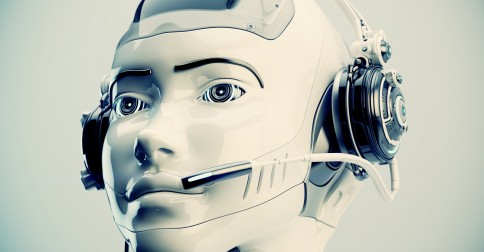The emotional literacy gap between bots and humans is expected to narrow, thanks to a series of technological advances.
copyright by knowledge.insead.edu
 When it comes to computational heavy lifting, artificial intelligence (AI) beats humans every time. But within the current technological limitations, no amount of number-crunching alone has yet enabled AI to develop emotional intelligence (EI). So far, there is no code for that. Even the most responsive chatbots rely upon speech recognition, natural language processing and other algorithms, making them incapable of reading between the lines of human communication.
When it comes to computational heavy lifting, artificial intelligence (AI) beats humans every time. But within the current technological limitations, no amount of number-crunching alone has yet enabled AI to develop emotional intelligence (EI). So far, there is no code for that. Even the most responsive chatbots rely upon speech recognition, natural language processing and other algorithms, making them incapable of reading between the lines of human communication.
For humans working in organisations, that’s very convenient. While some speculate that AI and machine learning will soon become key contributors to business strategy development, emotionally illiterate bots would be totally useless at strategy execution . For that, you need to be fluent in the extremely subtle and largely non-verbal language of collective emotion, which is often your only tool for gauging the progress of strategic change. Keeping EI and AI far apart limits the number of white-collar jobs that could ever be lost to automation.
However, as time and technology march on, the possibility of “emotional AI” is becoming less distant. Anticipating the increasing importance of emotions in business, IBM, Microsoft, Google, Apple, Amazon and others have all started their own face and emotion recognition programmes (e.g. Microsoft’s Azure Media Analytics and Apple’s Face ID). Start-ups are also jumping into the race, working with academics to develop and train relevant algorithms. Examples include Affectiva , NVISO and Kairos for face analysis in images and videos, and Behavioral Signals and Cogito for voice analysis.
To prepare for the eventual arrival of emotional AI, we should look closely at the likely pros and cons, thereby taking stock of our complex feelings about emotional bots.
Big implications
Some degree of unease at the idea of robots giving and receiving emotional feedback is understandable. However, the outcomes needn’t all be negative. Like any significant technological advance, emotional AI offers huge potential benefits to humanity in at least two ways.[…]
read more – copyright by knowledge.insead.edu
Thank you for reading this post, don't forget to subscribe to our AI NAVIGATOR!


The emotional literacy gap between bots and humans is expected to narrow, thanks to a series of technological advances.
copyright by knowledge.insead.edu
For humans working in organisations, that’s very convenient. While some speculate that AI and machine learning will soon become key contributors to business strategy development, emotionally illiterate bots would be totally useless at strategy execution . For that, you need to be fluent in the extremely subtle and largely non-verbal language of collective emotion, which is often your only tool for gauging the progress of strategic change. Keeping EI and AI far apart limits the number of white-collar jobs that could ever be lost to automation.
However, as time and technology march on, the possibility of “emotional AI” is becoming less distant. Anticipating the increasing importance of emotions in business, IBM, Microsoft, Google, Apple, Amazon and others have all started their own face and emotion recognition programmes (e.g. Microsoft’s Azure Media Analytics and Apple’s Face ID). Start-ups are also jumping into the race, working with academics to develop and train relevant algorithms. Examples include Affectiva , NVISO and Kairos for face analysis in images and videos, and Behavioral Signals and Cogito for voice analysis.
To prepare for the eventual arrival of emotional AI, we should look closely at the likely pros and cons, thereby taking stock of our complex feelings about emotional bots.
Big implications
Some degree of unease at the idea of robots giving and receiving emotional feedback is understandable. However, the outcomes needn’t all be negative. Like any significant technological advance, emotional AI offers huge potential benefits to humanity in at least two ways.[…]
read more – copyright by knowledge.insead.edu
Thank you for reading this post, don't forget to subscribe to our AI NAVIGATOR!
Share this: